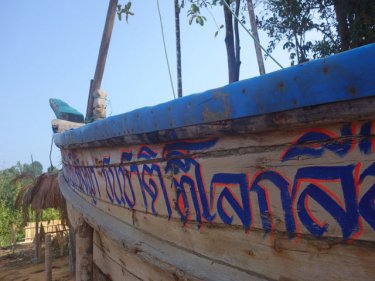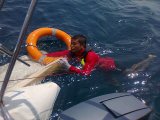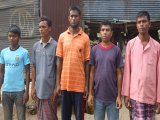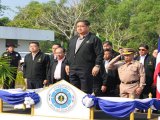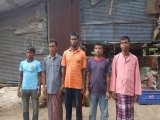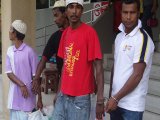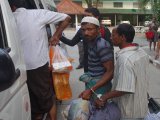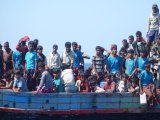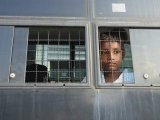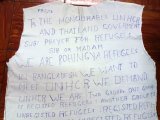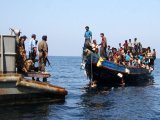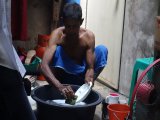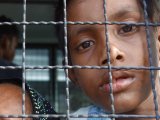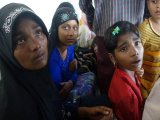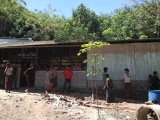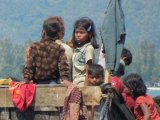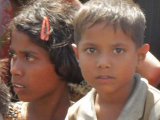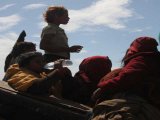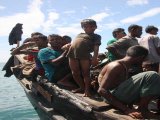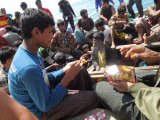HINLAD, Phang Nga: A fisherman told today for the first time of having a gun pointed at him by a military officer in a controversial incident that led to the deaths of an unknown number of boatpeople north of Phuket.
Fisherman Yutdhana Sangtong said today that four other fishermen were in the boat when the gun was pointed at him. They were ordered to leave. ''Go away. These people have been fed already. Get out,'' he says he was told at gunpoint.
Later, he heard a volley of gunshots, In the days that followed, Khun Yutdhana says, he found three bodies in the water nearby. Other fishermen around the district reported finding more bodies along the coast, around the village of Hinlad.
''One of the three bodies I found was a woman,'' Khun Yutdhana said today. ''My friends on the other side of the bay said they saw other bodies. We have compared notes. We think we saw 15 to 20 bodies altogether.''
Khun Yutdhana had gone to the Rohingya boat that morning, off a beach not far from Hinlad, on February 22, before sunrise. He wanted to help by giving the 130 Rohingya passengers on board some water. He was shocked at having the gun pointed at him. So were the other four people in the boat, he says.
But the fishermen did what they were told and soon after resumed their pursuit of crabs among the mangroves. ''Within an hour, we heard the gunfire,'' Khun Yutdhana said.
Later, Khun Yutdhana said today, he was surprised to see the Rohingya boat being towed north. He thought the intention had been for the passengers to be brought ashore for a meal before being set free to sail on, towards the south and Malaysia.
The dawn brought more surprises. ''We saw a Rohingya alive in the water,'' said Khun Yutdhana, ''and we pulled him up.''
Until now, the military and the villagers of Hinlad and around the port of Kuraburi have had a strong working relationship. What happened in the water off Tung Nang Dam beach early that day threatens to seriously damage that relationship.
Two versions of what happened have been told publicly. The boatpeople who jumped for their lives and survived have given their version. So have the villagers who heard the gunshots and later rescued Rohingya from the water.
The villagers of Hinlad - and Muslim villagers all along the Andaman Sea coast - are now waiting to hear what the military has to say.
Based on information supplied to Phuketwan and ABC Australia journalists by four Rohingya who survived the incident on February 22 and stayed in Hinlad for two weeks before going to Malaysia.
HEADING south, fleeing racism and oppression in Burma, the 130 people on the Rohingya boat ran out of fuel. On February 21 fishermen towed them to a beach on Surin island, a popular destination for diving, off the Andaman coast.
Back on the mainland, the women in the village of Hinlad prepared meals for the Rohingya and they were taken out to the boatpeople, who gratefully accepted them. Later that day, the patrol boat TOR 214 arrived. Some of the Rohingya fled at the sight of the authorities.
But they returned when the villagers told them, through a Bengali interpreter, that there was nothing to fear. The military would help them to the mainland to be properly fed. The boatpeople, including six women and two young children, were relieved to hear they were in safe hands.
Surin residents alerted the people of Hinlad that the boat would be arriving back at Kuraburi Pier. The womenfolk cooked a meal for the boatpeople. The 10pm arrival time came and went. At midnight, they decided not to wait and longer. They went home.
The boatpeople said that instead of being taken to Kuraburi pier, they were taken to a more remote beach. Before dawn about 20 or more were ordered to leave their relatively large boat for a much smaller vessel. Those who were ordered to leave had no idea what was going on. They did not want to be separated from the friends and family with whom they sailed from Burma.
A shot was fired into the air, apparently to warn them there would be more trouble if they did not do what they were told. In a panic in the dark and having no understanding of the Thai language, one or two men jumped into the water. Others followed.
Many more shots were fired. One of the survivors said he was sure he saw at least one man, shot dead in the water.
The survivors were rescued by fishermen.
Villagers have told their accounts to Phuketwan journalists in a long series of interviews over two trips made to Hinlad
RECENTLY the villagers in and around Kuraburi have encountered hundreds of Rohingya sailing south, past Thailand. The villagers have developed a deep sympathy for the people in the boats, not just because they are fellow Muslims, but because they have heard the nightmarish tales of life in Burma, of villagers being burned from their homes, of rape and of race-hate.
Hinlad is one of several villages along Thailand's Andaman Sea coast where the boatpeople have learned, through feedback from people who have already made the journey, that they can expect to find sympathy and comfort.
The villagers have never been entirely satisfied with Thailand's treatment of the Rohingya, which of late involves ''helping them on'' towards Malaysia. If they had their way, Thailand would be far more generous and caring.
Strictly speaking, the Rohingya are not allowed to land in Thailand. But this year, with women and children among the men and boys for the first time, compassionate men in uniform and the sympathetic villagers have usually done their best to make sure that food, water and whatever the boatpeople need is provided.
Because the countries of Asean allow Burma to drive into the sea its unwanted Rohingya population by the thousands, without interfering, the military along the Andaman coast and the villagers are kept busy, tending to Burma's stateless outcasts.
Thailand also never deals with the issue at its heart, in Burma, so the exodus continues, with the patrol boats and the villagers picking up the pieces as best they can.
In Hinlad, sympathy for the boatpeople has grown to the point where a Rohingya vessel has been propped up in a park near the local mosque and emblazoned with the words in Thai: ''The Rohingya, an ethnic group that the whole world has forgotten.''
Little wonder, then, that whatever happened on that dark morning 20 days ago has stirred the village as never before and caused them, as loyal Thai citizens, to question both the actions of their own military and the policy of their own government.
THERE is no account of what happened on February 21 and February 22 so far from the Royal Thai Navy because, according to statements from senior officers, nothing happened. This brick wall ''no comment'' flies in the face of logic and the best interest of the Navy especially. The accusations that something untoward happened come not just from Rohingya boatpeople who survived the incident but from Thai villagers who have, until now, worked wholeheartedly with the military.
The villagers all along the coast have long maintained deep suspicions that some of the military have been working with people-traffickers. A senior officer in the Navy has admitted as much. But there have been no further details.
Just why did the military tow the Rohingya boat to an isolated part of the coast then order 20 or more people to move to a second, smaller boat? Where did the military vessel tow the large Rohingya boat, and where are those 110 people now? Why did the military on the boat feel it was necessary to fire a volley of shots that were heard by fisherman and villagers for kilometres around?
The Navy and other arms of the military and police along the Andaman coast are saying nothing, because nothing happened. There was no incident. In the light of what others are saying, that is a far from convincing response.
WHETHER or not a number of Rohingya boatpeople were shot or drowned needlessly in the waters off Thailand's Andaman Sea coast, one thing is certain: the Navy and other arms of the military must provide a detailed account of what took place.
Prime Minister Yingluck Shinawatra has already guaranteed the international media an investigation. Her promise must be kept. The military's blanket denial works against its own best interests.
Everyone understands that the boatpeople are Burma's problem. However, unless the Burmese government is forced to find a realistic solution, the military and the villagers along Thailand's Andaman coast will continue to share that problem.
It has long been recognised that the Rohingya issue, if not resolved within Burma, has the potential to inflame passions elsewhere in the region. The military would be well advised to listen to the Thai citizens of Hinlad and to heed what they have to say about the limits of tolerance.
THE ABC learns of claims that the Thai military shot Rohingya asylum seekers fleeing conflict in western Burma.
http://www.abc.net.au/news/2013-03-08/accusations-thai-military-shot-fleeing-refugees/4562006/
A military vessel connects with a Rohingya boat
allowfullscreen>
Would-be refugees on a beach at Surin island
allowfullscreen>
Fisherman Yutdhana Sangtong said today that four other fishermen were in the boat when the gun was pointed at him. They were ordered to leave. ''Go away. These people have been fed already. Get out,'' he says he was told at gunpoint.
Later, he heard a volley of gunshots, In the days that followed, Khun Yutdhana says, he found three bodies in the water nearby. Other fishermen around the district reported finding more bodies along the coast, around the village of Hinlad.
''One of the three bodies I found was a woman,'' Khun Yutdhana said today. ''My friends on the other side of the bay said they saw other bodies. We have compared notes. We think we saw 15 to 20 bodies altogether.''
Khun Yutdhana had gone to the Rohingya boat that morning, off a beach not far from Hinlad, on February 22, before sunrise. He wanted to help by giving the 130 Rohingya passengers on board some water. He was shocked at having the gun pointed at him. So were the other four people in the boat, he says.
But the fishermen did what they were told and soon after resumed their pursuit of crabs among the mangroves. ''Within an hour, we heard the gunfire,'' Khun Yutdhana said.
Later, Khun Yutdhana said today, he was surprised to see the Rohingya boat being towed north. He thought the intention had been for the passengers to be brought ashore for a meal before being set free to sail on, towards the south and Malaysia.
The dawn brought more surprises. ''We saw a Rohingya alive in the water,'' said Khun Yutdhana, ''and we pulled him up.''
Until now, the military and the villagers of Hinlad and around the port of Kuraburi have had a strong working relationship. What happened in the water off Tung Nang Dam beach early that day threatens to seriously damage that relationship.
Two versions of what happened have been told publicly. The boatpeople who jumped for their lives and survived have given their version. So have the villagers who heard the gunshots and later rescued Rohingya from the water.
The villagers of Hinlad - and Muslim villagers all along the Andaman Sea coast - are now waiting to hear what the military has to say.
The Boatpeople Survivors' Account
Based on information supplied to Phuketwan and ABC Australia journalists by four Rohingya who survived the incident on February 22 and stayed in Hinlad for two weeks before going to Malaysia.
HEADING south, fleeing racism and oppression in Burma, the 130 people on the Rohingya boat ran out of fuel. On February 21 fishermen towed them to a beach on Surin island, a popular destination for diving, off the Andaman coast.
Back on the mainland, the women in the village of Hinlad prepared meals for the Rohingya and they were taken out to the boatpeople, who gratefully accepted them. Later that day, the patrol boat TOR 214 arrived. Some of the Rohingya fled at the sight of the authorities.
But they returned when the villagers told them, through a Bengali interpreter, that there was nothing to fear. The military would help them to the mainland to be properly fed. The boatpeople, including six women and two young children, were relieved to hear they were in safe hands.
Surin residents alerted the people of Hinlad that the boat would be arriving back at Kuraburi Pier. The womenfolk cooked a meal for the boatpeople. The 10pm arrival time came and went. At midnight, they decided not to wait and longer. They went home.
The boatpeople said that instead of being taken to Kuraburi pier, they were taken to a more remote beach. Before dawn about 20 or more were ordered to leave their relatively large boat for a much smaller vessel. Those who were ordered to leave had no idea what was going on. They did not want to be separated from the friends and family with whom they sailed from Burma.
A shot was fired into the air, apparently to warn them there would be more trouble if they did not do what they were told. In a panic in the dark and having no understanding of the Thai language, one or two men jumped into the water. Others followed.
Many more shots were fired. One of the survivors said he was sure he saw at least one man, shot dead in the water.
The survivors were rescued by fishermen.
The Hinlad Villagers' Account
Villagers have told their accounts to Phuketwan journalists in a long series of interviews over two trips made to Hinlad
RECENTLY the villagers in and around Kuraburi have encountered hundreds of Rohingya sailing south, past Thailand. The villagers have developed a deep sympathy for the people in the boats, not just because they are fellow Muslims, but because they have heard the nightmarish tales of life in Burma, of villagers being burned from their homes, of rape and of race-hate.
Hinlad is one of several villages along Thailand's Andaman Sea coast where the boatpeople have learned, through feedback from people who have already made the journey, that they can expect to find sympathy and comfort.
The villagers have never been entirely satisfied with Thailand's treatment of the Rohingya, which of late involves ''helping them on'' towards Malaysia. If they had their way, Thailand would be far more generous and caring.
Strictly speaking, the Rohingya are not allowed to land in Thailand. But this year, with women and children among the men and boys for the first time, compassionate men in uniform and the sympathetic villagers have usually done their best to make sure that food, water and whatever the boatpeople need is provided.
Because the countries of Asean allow Burma to drive into the sea its unwanted Rohingya population by the thousands, without interfering, the military along the Andaman coast and the villagers are kept busy, tending to Burma's stateless outcasts.
Thailand also never deals with the issue at its heart, in Burma, so the exodus continues, with the patrol boats and the villagers picking up the pieces as best they can.
In Hinlad, sympathy for the boatpeople has grown to the point where a Rohingya vessel has been propped up in a park near the local mosque and emblazoned with the words in Thai: ''The Rohingya, an ethnic group that the whole world has forgotten.''
Little wonder, then, that whatever happened on that dark morning 20 days ago has stirred the village as never before and caused them, as loyal Thai citizens, to question both the actions of their own military and the policy of their own government.
The Thai Navy's Account
THERE is no account of what happened on February 21 and February 22 so far from the Royal Thai Navy because, according to statements from senior officers, nothing happened. This brick wall ''no comment'' flies in the face of logic and the best interest of the Navy especially. The accusations that something untoward happened come not just from Rohingya boatpeople who survived the incident but from Thai villagers who have, until now, worked wholeheartedly with the military.
The villagers all along the coast have long maintained deep suspicions that some of the military have been working with people-traffickers. A senior officer in the Navy has admitted as much. But there have been no further details.
Just why did the military tow the Rohingya boat to an isolated part of the coast then order 20 or more people to move to a second, smaller boat? Where did the military vessel tow the large Rohingya boat, and where are those 110 people now? Why did the military on the boat feel it was necessary to fire a volley of shots that were heard by fisherman and villagers for kilometres around?
The Navy and other arms of the military and police along the Andaman coast are saying nothing, because nothing happened. There was no incident. In the light of what others are saying, that is a far from convincing response.
The February 22 Incident: A Conclusion
WHETHER or not a number of Rohingya boatpeople were shot or drowned needlessly in the waters off Thailand's Andaman Sea coast, one thing is certain: the Navy and other arms of the military must provide a detailed account of what took place.
Prime Minister Yingluck Shinawatra has already guaranteed the international media an investigation. Her promise must be kept. The military's blanket denial works against its own best interests.
Everyone understands that the boatpeople are Burma's problem. However, unless the Burmese government is forced to find a realistic solution, the military and the villagers along Thailand's Andaman coast will continue to share that problem.
It has long been recognised that the Rohingya issue, if not resolved within Burma, has the potential to inflame passions elsewhere in the region. The military would be well advised to listen to the Thai citizens of Hinlad and to heed what they have to say about the limits of tolerance.
Villagers' Video Shows Boatpeople
Television Report from ABC Australia
THE ABC learns of claims that the Thai military shot Rohingya asylum seekers fleeing conflict in western Burma.
http://www.abc.net.au/news/2013-03-08/accusations-thai-military-shot-fleeing-refugees/4562006/
A military vessel connects with a Rohingya boat
Would-be refugees on a beach at Surin island

